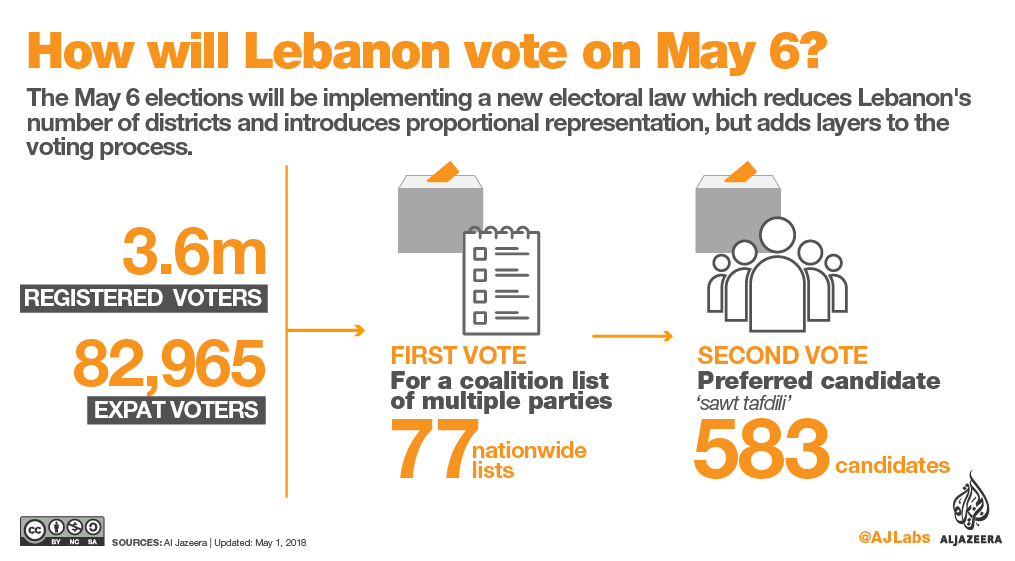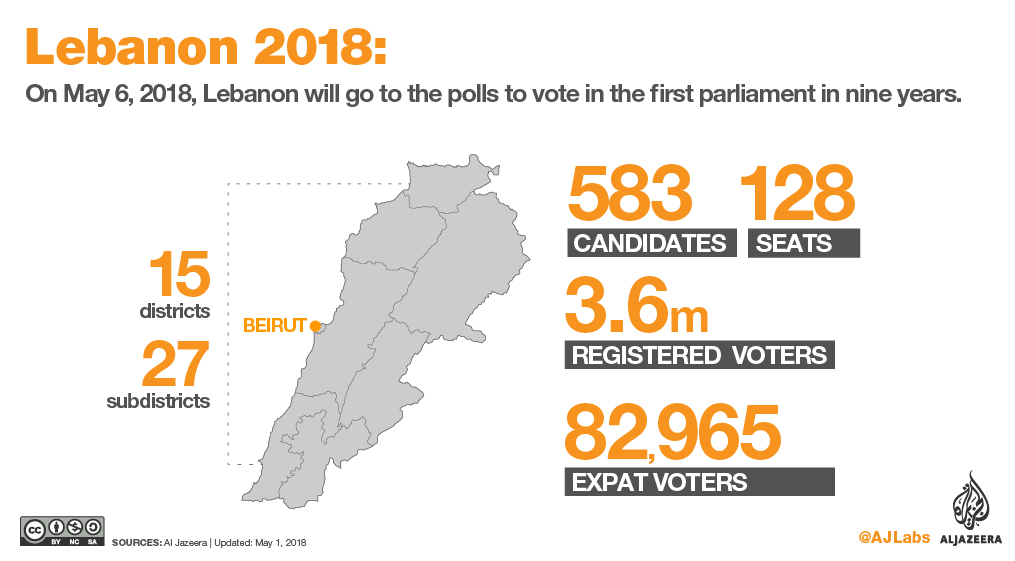In Lebanon’s Zahle, elections are local
Bizarre alliances competing for one eastern city’s seven seats reflect manoeuvring for votes in parliamentary elections.

Zahle, Lebanon – The third-largest city in Lebanon – and the most populous district in the country’s eastern region – is witnessing bizarre political alliances competing for its seven seats in Sunday’s parliamentary election.
Five mixed-party candidate lists have been formed in Zahle, embodying the dizzying scramble across Lebanon, as political parties realign themselves to match the new electoral law.
Keep reading
list of 4 itemsNorth Macedonia votes in presidential polls as EU membership bid looms
‘Absolute power’: After pro-China Maldives leader’s big win, what’s next?
Solomon Islands pro-China PM Manasseh Sogavare fails to secure majority
Per the strict sectarian quota governing politics in Lebanon and the new electoral law’s redistricting scheme, Zahle’s district – administratively known as Bekaa 1 – is allocated seven seats: one Sunni, one Shia, two Greek Catholics, one Maronite, one Armenian Orthodox and one Greek Orthodox.
Traditional political foes, the predominantly Sunni party Future Movement (FM), led by Saad Hariri, Lebanon’s prime minister, and the Christian-Maronite Free Patriotic Movement (FPM), founded by President Michel Aoun and led by his son-in-law Gebran Bassil, the foreign minister, joined forces under one list: Zahle Lal Kil (Arabic for Zahle is Everybody’s).
On the other hand, FPM’s close allies, Hezbollah and Amal, are running in a coalition of powerful local figures on a separate list, Zahle: Al Khayar wal Karar (Arabic for Zahle is the Choice and Decision).
|
|
But none of this is too strange for the people of Zahle. In fact, it is necessary.
Sitting at their home in Kabelias, a village in the southern part of Zahle, Dirar al-Ghazal, an 80-year-old retired government employee, and his wife, Hind, reminisced about a far-off time when no one cared which sect their neighbour ascribed to.
“I miss the past. It was peaceful. No one hated anyone,” she said, speaking of the era prior to the bloody 15-year civil war that tarnished and divided Lebanon.
But forming political alliances are “absolutely crucial for his country to move forward,” al-Ghazal said, who will be voting for the list Zahle Lal Kil.
“We want security. We want justice. We want accountability. There is a lot of corruption that needs to be eradicated.”
For al-Ghazal, Hariri is the one who “cares about Lebanon as a whole”, and says Hariri’s campaign with a historical nemesis, FPM, is only proof of that.
A strategic crossroad
The city of Zahle is commonly referred to by Lebanese as the country’s “capital for Catholics”.
Its surrounding villages, which together with the city of Zahle form the Bekaa 1 electoral district, are a multi-confessional oasis of Christians, Druze, Sunni and Shia Muslims.
The eastern enclave is also a strategic crossroad, not only connecting Lebanon with the route to Damascus, but also perched between the Shia-majority, Hezbollah-controlled northern Bekaa Valley and Sunni majorities to the south and west.
Zahle’s diverse population, along with its proximity to the Syrian border, encapsulates the wide range of crises that have impacted Lebanon in recent years.
|
|
The neighbouring Syrian conflict led to Zahle’s absorption of a large number of Syrians, a major concern and one frequently raised in local politics.
For Haykal Abu Hamra, who owns a cafe in the city, Zahle’s melting-pot demographics are what makes the district so unique.
“My family has owned this cafe for 70 years. This cafe has gathered people from all aspects of life. The poor and the rich, the employer and the employee – they all sit together at the same table,” Abu Hamra said.
“It’s not right to fight with someone today because of elections, when over the following 11 months, you’ll see their faces every day,” he said, explaining that he does not like revealing who he will be voting for, naming other parties, or even speaking of his own sect.
For Abu Hamra, political alliances of convenience are not only necessary, but are a common practice elsewhere and above all expected.
What is not acceptable, however, is to “impose non-Zahlaoui candidates” on the people of Zahle, he said – a view that was seconded by all the patrons sitting in his cafe.
“We will not vote for someone who is from outside of Zahle. Someone who will not open their door when we come knocking,” said Najib, a government employee who preferred not to reveal his last name.
Dominant sectarian imprint
Under the new electoral law, passed in June 2017 after years of parliamentary gridlock, Lebanon will now allocate parliamentary seats on a proportional basis, but also provides the option for voters to select their favourite single candidate.
Political parties have attempted to account for the complexities of the new law, in part, by assembling these equally complex local alliances – many of which contradict the candidate lists parties have created even in neighbouring districts.
As such, the law has indirectly encouraged voters to opt for even more local political answers.

Three more lists, less unconventional than those outlined above, are also running in the district: One is Zahle Kadiyatouna (Arabic for Zahle is Our Cause), a list combining Lebanese Forces and Kataeb, otherwise known as the Phalanges.
Both parties represent Christian sects, and have been tense but recurring political allies since Lebanon’s civil war.
Another list, Kotla Shaabia (Popular Bloc) was launched by Zahle local Miriam Skaff, considered to be the main competitor of Kataeb and LF’s alliance.
Finally, a fifth list of independents will vie for seats as Kollouna Watani (We Are All the Nation).
“Everyone is going to vote for their sect, regardless of the political alliances [established],” said another resident of Zahle, who refused to disclose his name or profession.
“You’ll see, after all these battles during the elections and after all the scuffles between people, they [politicians] will sit with each other again,” he said, in reference to a number of scuffles that occurred in the last week, between supporters of rival groups across the country.

“People don’t understand this. After the election, the same people will sit at the same table again,” the unnamed Zahle resident said.
“It’s called politics. Yesterday’s enemy is tomorrow’s ally.”
When pressed on his opinion of the independent Kollouna Watani list, he said that two of his friends are running “with the independents”.
“But civil society [candidates] cannot work in a sectarian country,” he said.
“This is a country that has 18 sects,” he said, adding that, although he respects the independents’ ambitions, as a Christian, he will not vote for an independent Muslim candidate.
“In Lebanon, you have five million people. How many votes are they hoping to get? Twenty thousand votes? They will never change the mentality here.
“The sectarian imprint is dominant in Lebanon. You can work together, but when it comes to, for example, inter-sectarian marriages, people avoid that. We didn’t create this. We were born like this,” he added.

As elites manoeuvre across sectarian lines to preserve their status quo, forming cross-sectarian political alliances – what the scholar Jeffery Karam called “alliances between strange bedfellows” in a 2016 report – has actually long been common practice in Lebanon.
But speculation has been growing in recent years, anticipating a lapse in the governing binary of the country’s March 8 and March 14 camps, which has guided Lebanese politics since 2006.
With nine years of crises and a new electoral system that no one seems to fully grasp, the temporary and shifting alliances of Sunday’s vote will determine the fate of the country’s traditional political divide.
For the people of Zahle, it is imperative that the district’s politics remain local.
According to Najib, and others at the cafe, politicians have a tradition of neglecting their constituencies as soon as they have secured their votes.
“Tomorrow, they will be looking at their watches [saying]: ‘It’s 10 to midnight, it’s five to midnight. It’s midnight, now I am shutting my phone down,'” said one of Abu Hamra’s customers, requesting to remain unnamed.
Abu Hamra said: “That’s why it’s important to vote for people from here. People we can see and hold accountable.”